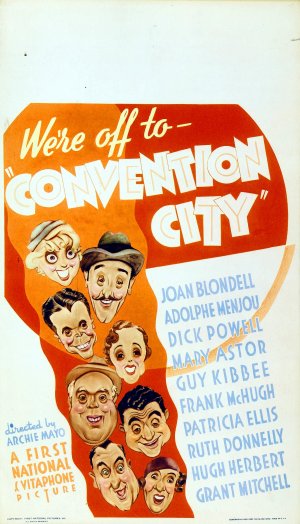Convention City (lost risqué comedy film; 1933): Difference between revisions
No edit summary |
No edit summary |
||
| Line 1: | Line 1: | ||
{{InfoboxLost | |||
'''''Convention City''''' is a 1933 Warner Bros | |title=<center>Convention City</center> | ||
|image=Convention_City_FilmPoster.jpeg | |||
|imagecaption=Poster for the film. | |||
|status=<span style="color:red;">'''Lost'''</span> | |||
}} | |||
'''''Convention City''''' is a 1933 comedy film produced by Warner Bros.<ref>[https://en.wikipedia.org/wiki/Convention_City Wikipedia article.] Retrieved 15 Mar '16.</ref> It was notable for its risque humor, lewd dialogue, and full-frontal nudity. This film was among those responsible for the implementation of The Hayes Code, which censored sex and violence in films, in Hollywood. | |||
During its production, Jack Warner urged costume designer, Hal Wallis, many times to tone down the costumes in the film. Fearing the film's artistic vision would be compromised, Wallis refused to make the costumes more family friendly. Warner also ordered for a few lines to be cut from the film, of which only a few were. When the film opened, it was heavily censored or downright banned, despite its critical acclaim. Many theaters destroyed their copies of the film, thinking it promoted corrupt morals and anti-Christian messages. | During its production, Jack Warner urged costume designer, Hal Wallis, many times to tone down the costumes in the film. Fearing the film's artistic vision would be compromised, Wallis refused to make the costumes more family friendly. Warner also ordered for a few lines to be cut from the film, of which only a few were. When the film opened, it was heavily censored or downright banned, despite its critical acclaim. Many theaters destroyed their copies of the film, thinking it promoted corrupt morals and anti-Christian messages. | ||
| Line 6: | Line 12: | ||
Warner Bros reportedly "junked" all remaining copies of the film in 1948. A movie theater in Spain continued to show the film as late as 1942, and reportedly held onto its copy. This copy, though, has yet to be found. Over 200 production stills as well as the script survive. No copies of the film have surfaced after its apparent "junk"-ing. | Warner Bros reportedly "junked" all remaining copies of the film in 1948. A movie theater in Spain continued to show the film as late as 1942, and reportedly held onto its copy. This copy, though, has yet to be found. Over 200 production stills as well as the script survive. No copies of the film have surfaced after its apparent "junk"-ing. | ||
In the 1990s, it became the only film whose stock footage has survived longer than the actual film itself. Stock footage of various Atlantic City establishing shots were discovered in a studio vault. In 1994, a dramatic reading of the film's script was held at a pre-Hayes Code film festival. The film is heavily sought-after for its humor and content. | In the 1990s, it became the only film whose stock footage has survived longer than the actual film itself. Stock footage of various Atlantic City establishing shots were discovered in a studio vault.<ref>[http://www.examiner.com/article/1930-s-dirtiest-movie-destroyed-and-other-rare-movies Examiner article including this film.] Retrieved 15 Mar '16.</ref> In 1994, a dramatic reading of the film's script was held at a pre-Hayes Code film festival. The film is heavily sought-after for its humor and content. | ||
==References== | |||
<references/> | |||
[[Category:Lost films]] | [[Category:Lost films]] | ||
Revision as of 22:16, 15 March 2016
Convention City is a 1933 comedy film produced by Warner Bros.[1] It was notable for its risque humor, lewd dialogue, and full-frontal nudity. This film was among those responsible for the implementation of The Hayes Code, which censored sex and violence in films, in Hollywood.
During its production, Jack Warner urged costume designer, Hal Wallis, many times to tone down the costumes in the film. Fearing the film's artistic vision would be compromised, Wallis refused to make the costumes more family friendly. Warner also ordered for a few lines to be cut from the film, of which only a few were. When the film opened, it was heavily censored or downright banned, despite its critical acclaim. Many theaters destroyed their copies of the film, thinking it promoted corrupt morals and anti-Christian messages.
Warner Bros reportedly "junked" all remaining copies of the film in 1948. A movie theater in Spain continued to show the film as late as 1942, and reportedly held onto its copy. This copy, though, has yet to be found. Over 200 production stills as well as the script survive. No copies of the film have surfaced after its apparent "junk"-ing.
In the 1990s, it became the only film whose stock footage has survived longer than the actual film itself. Stock footage of various Atlantic City establishing shots were discovered in a studio vault.[2] In 1994, a dramatic reading of the film's script was held at a pre-Hayes Code film festival. The film is heavily sought-after for its humor and content.
References
- ↑ Wikipedia article. Retrieved 15 Mar '16.
- ↑ Examiner article including this film. Retrieved 15 Mar '16.
